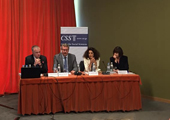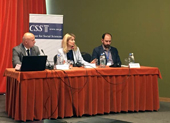
International Conference on Democracy and Security in Tbilisi
By Inga Kakulia
Tuesday, June 4
The ESDN 2019 International Conference on Democracy and Security was held in Tbilisi on June 3. During the conference, the representatives from strategic allies as well as various social scientists discussed the nexus between Democracy and Security and the current challenges facing Georgia on its way to becoming a full-fledged democracy, and a member state of EU and NATO.
The Morning Plenary, moderated by Giorgi Khelashvili, the Member of the Georgian Parliament, covered the topics of Open Doors, Liberal Democracy and Security.
The speakers were the EU Ambassador to Georgia, Carl Hartzell, Dr. Rosaria Puglisi from the NATO Liaison Office in Georgia and The Charges D’Affaires Elizabeth Rood of the U.S Embassy.
During the speech, Ambassador Hartzell highlighted the main topics of focus for Georgia. He stressed the importance of elections and citizen participation as tools for strengthening democracy. “Democracy is a bicycle, it needs to move forward” was the phrase brought up quite a lot during the conference. To stress the point that even though Georgia has done quite a lot to move towards a fully democratic society, the need for constant improvement is still there. “Democracy and Security are mutually reinforcing,” said Ambassador Hartzell. The modern times have only reinforced this statement. Another important point mentioned was the trust of the population. Trust in the security institutions, as well as in the medical institutions and the government is crucial for a properly functioning society.
During her speech, Dr. Rosaria Puglisi mentioned that despite the emphasis of NATO’s security and defense aspects, it is also a political organization, which values resilience in all its members and partners. It is an essential quality of all member states and is perceived as a natural responsibility. The topic of new kinds of security threats was also discussed along with the Russian agenda and the importance of resistance.
Elizabeth Rood touched on the importance of Transatlantic relationship, as well as the importance of Europe in making the relationship between the United States and Georgia work. Yet again, the secure connection between the democratic institutions and their performance and the integration into the western alliances was stressed by Elizabeth Rood.
During the second panel the speakers, Dr. Maryna Vorotnyuk of Central European Univesity, from Ukraine and Tigran Grigoryan from Armenia’s National Revival party discussed their respective countries and the pressing local challenges. When talking about Ukraine and eastern partnership, Dr. Vorotnyuk mentioned that “Ukraine and Georgia are Security orphans” - the phrase coined by Korneli Kakachia, the moderator of the second panel. But as Dr. Vorotnyuk said during her speech, Ukraine upgraded quite a lot in the security department, less so in democratic institutions. The speaker also mentioned that the general attitudes have changed and it is no longer acceptable to be openly pro-Russian.
Meanwhile, Mr. Grigoryan talked about how for the 20 years the discourse in Armenia deemed Security to be incompatible with democracy. This narrative was used to justify a semi-autocratic regime in the country. The turning point for the nation was when during the need for security and defense forces, they failed to succeed during the April war. The conventional wisdom was that to sustain security one cannot live under a democracy. But when the lack of democracy failed to make up for the security needs, the overall narrative changed. Mr. Grigoryan stressed that when talking about democratic peace, it’s important to mention that we are speaking about liberal democracy. According to the speaker, the liberal aspect of the approach is even more important than democracy.
During the closing session, the speakers discussed Georgia in Search of the Democracy-Security Nexus as well as the Democratization and War in the South Caucasus.


